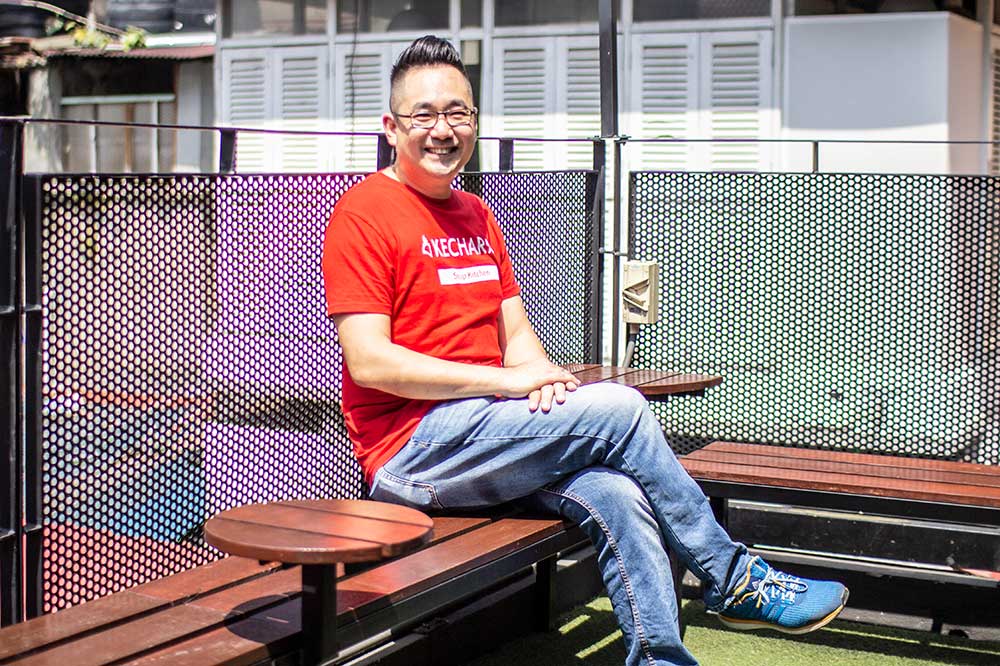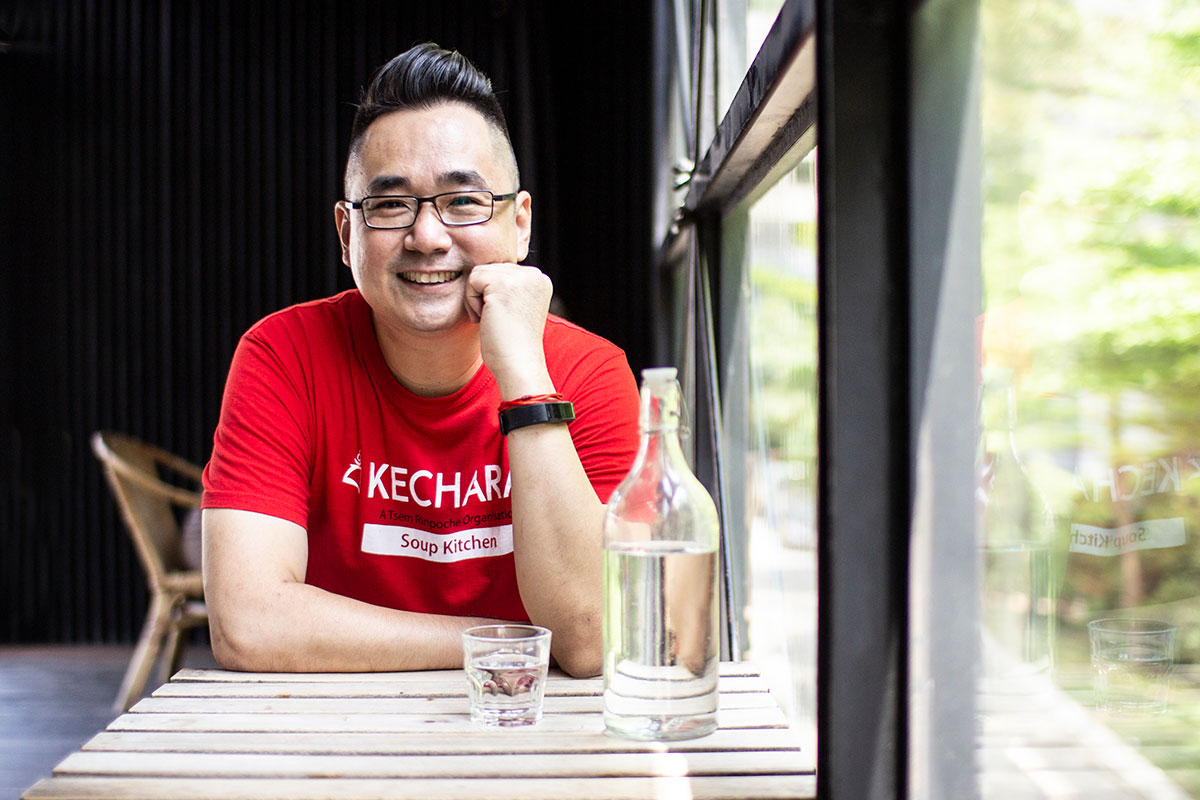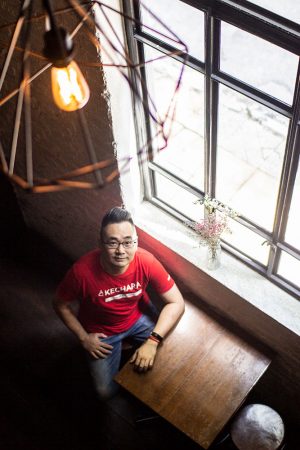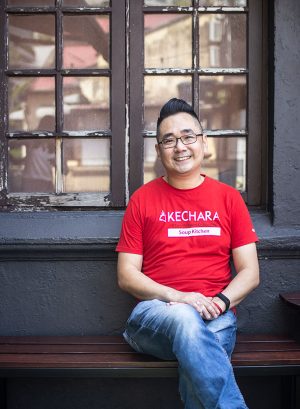Justin gave up a high flying career in banking and finally found fulfilment in voluntarism.

It is already 15 minutes past our appointment with Justin Cheah but he still has not made an appearance. It should not take too long for him to get here from his workplace. A 10 minutes’ drive, tops.
Justin is all flushed when he walks in a few minutes later. He apologises for being late and says that he walked over from his workplace. It would have been a good 20 minutes’ walk under the blazing afternoon sun.
“Well, I didn’t think it was too far, so I thought I’ll walk over. Guess, I was wrong,” he smiles.
This is what that makes Justin who he is. Working with Kechara Soup Kitchen as an Operations Director, he likes to keep things in life simple. He prefers to maintain a minimalistic lifestyle.
The deep, dark void
Life wasn’t always so simple. Justin used to work as a banker. Coming from a difficult childhood, he was determined from young to make it in life. He wanted to earn a steady living and have things that he was deprived off – a home, a family of his own and never having to feel the pinch.
But when he worked as a banker in a top bank, he felt like there was a void in his life. He was not happy in the steady routine he had carved out. While many would be glad to have a routine as well as a hefty paycheck, he felt like he was trapped on a hamster wheel, running with no end in sight.
“I started questioning myself if this was what life was all about. I wondered if I would be doing this for the rest of my life. I was miserable.”
He felt like his job did not give any fulfilment. He battled feelings of guilt as he met clients daily, convincing them to take up products or services that he did not believe in himself.
“Deep down, I would know that whatever it is I was offering them, was not suitable. But to hit my target for the month, I had to do it. It made me feel like a hypocrite,” he says with a distant look on his face.
Adrift and all alone
 At that time, those around him could not understand why he was feeling the way he did. It was a perfectly normal life, to go work and make a good living. Even his girlfriend at the time who worked with him was unable to relate.
At that time, those around him could not understand why he was feeling the way he did. It was a perfectly normal life, to go work and make a good living. Even his girlfriend at the time who worked with him was unable to relate.
“I felt like everyone around me was fake, even my girlfriend. She had a similar job like me, but she could not relate to what I was feeling. I couldn’t explain it either.”
Eventually, the relationship did not work out, and Justin was left feeling more bereft than ever.
“I felt empty; there is no other way to describe it. I went through the days feeling wooden, almost mechanical. I did what I had to do, but I felt nothing. I was numb.”
The ‘light bulb’ moment
 Although he did not seek any help to get through this dark period in his life, it took a leap of faith to come out of it. It was during this turbulent period of his life Justin met Tsem Rinpoche, Kechara Soup Kitchen’s founder.
Although he did not seek any help to get through this dark period in his life, it took a leap of faith to come out of it. It was during this turbulent period of his life Justin met Tsem Rinpoche, Kechara Soup Kitchen’s founder.
He bumped into him at a shopping mall, a twist of fate, as Justin calls it.
“Unlike other monks, it was easy to relate to Tsem Rinpoche. He was young and was just another guy like me. We got talking, and before I knew it, I started talking about things that I had not shared with others.”
Rinpoche offered some very simple advice. He pointed out that the reason for his unhappiness was because he was not doing anything to be happy. He was stuck in a job he detested and that was the root to his problems. The vicious cycle of dragging himself to work only to make ends meet made it impossible to climb out of the dark hole he had fallen in.
“At that moment, it was like a light bulb was switched on. It’s simple; if you want to be happy, you have to do things that made you happy.”
In pursuit of happiness
 After the soul-stirring talk, Justin recalled moments of his childhood, times when life was simple. He grew up with his grandparents, and he remembered how his grandmother never failed to help those around them. They did not have much themselves, but that didn’t stop his grandparents from being generous. He also remembered her bright smile and cheery nature; perhaps her giving heart lightened her woes.
After the soul-stirring talk, Justin recalled moments of his childhood, times when life was simple. He grew up with his grandparents, and he remembered how his grandmother never failed to help those around them. They did not have much themselves, but that didn’t stop his grandparents from being generous. He also remembered her bright smile and cheery nature; perhaps her giving heart lightened her woes.
In pursuit of happiness, Justin decided to volunteer at the Kechara Soup Kitchen. After that, he started to look forward towards the weekend to get back to the soup kitchen.
“First, I started by volunteering a few hours over the weekends. I realised I felt better when I was able to help others. When I was not thinking so much about myself, the black cloud that was hovering over me seemed to disappear.”
He started to spend more time in getting food out to the homeless and working out the logistics for the team of people who came together for the cause. Soon, he started to take time off work to spend more time in the soup kitchen.
Eventually, he left his job and took up a full-time position at Kechara. The job came with lesser pay and perks, but he chose his contentment over other materialistic needs.
Friends warned him that he was making a mistake, but eleven years and a wife later, Justin has no regrets and is still going on strong.
“Not everything is about money.”
“You cannot put a price on mental health and contentment. Sure, I could have stayed where I was and been miserable,” he muses, “But I took a chance, and truth be told, I have more now than what I had before. I didn’t even need to make that much of an adjustment.”
Now, he cannot imagine doing anything different. His own past makes him more sensitive towards the plight of the homeless. He often goes above the call of duty. He intervenes in instances when someone needs more than just food. He tries to get drug addicts into rehabilitation centres, tends to the sick and reunites lost family members with their loved ones.
“If things hadn’t gone the way they did for me, I could have ended up just like them, on the streets. I got lucky,” he says.
Photos: Gan Yew Chin






